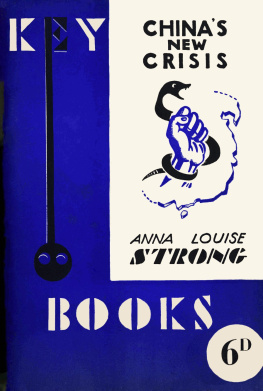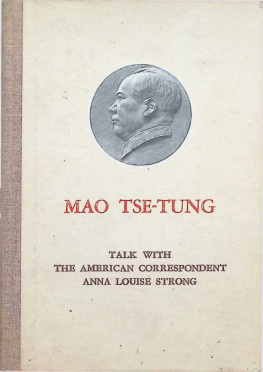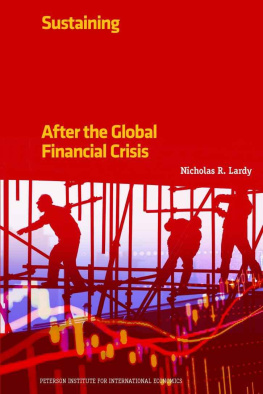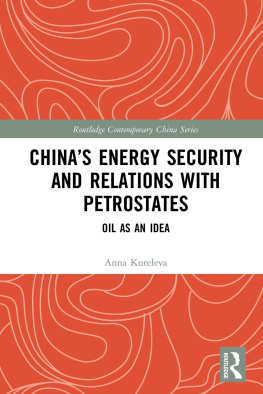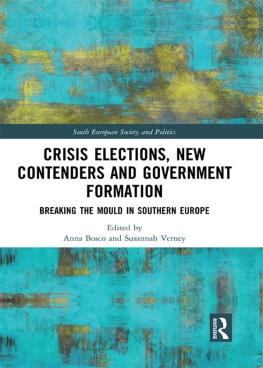Anna Louise Strong - Chinas new Crisis
Here you can read online Anna Louise Strong - Chinas new Crisis full text of the book (entire story) in english for free. Download pdf and epub, get meaning, cover and reviews about this ebook. year: 1942, publisher: Fore Publications Ltd, genre: Politics. Description of the work, (preface) as well as reviews are available. Best literature library LitArk.com created for fans of good reading and offers a wide selection of genres:
Romance novel
Science fiction
Adventure
Detective
Science
History
Home and family
Prose
Art
Politics
Computer
Non-fiction
Religion
Business
Children
Humor
Choose a favorite category and find really read worthwhile books. Enjoy immersion in the world of imagination, feel the emotions of the characters or learn something new for yourself, make an fascinating discovery.
- Book:Chinas new Crisis
- Author:
- Publisher:Fore Publications Ltd
- Genre:
- Year:1942
- Rating:5 / 5
- Favourites:Add to favourites
- Your mark:
- 100
- 1
- 2
- 3
- 4
- 5
Chinas new Crisis: summary, description and annotation
We offer to read an annotation, description, summary or preface (depends on what the author of the book "Chinas new Crisis" wrote himself). If you haven't found the necessary information about the book — write in the comments, we will try to find it.
Chinas new Crisis — read online for free the complete book (whole text) full work
Below is the text of the book, divided by pages. System saving the place of the last page read, allows you to conveniently read the book "Chinas new Crisis" online for free, without having to search again every time where you left off. Put a bookmark, and you can go to the page where you finished reading at any time.
Font size:
Interval:
Bookmark:
CHINAS NEW CRISIS
by
ANNA LOUISE STRONG
with other authentic documents
Published by FORE PUBLICATIONS LTD.
2 Parton Street, W.C.1
Printed in Great Britain by
Dorset County Chronicle, Trinity Street, Dorchester
epub version 1.0
This pamphlet contains a recent article by Anna Louise Strong, first printed in the American journal Amerasia. The other material published with it includes the Chinese Communist Partys account of the negotiations which preceded and succeeded the government order to the New Fourth Army to evacuate both the Southern and Northern banks of the Yangtze, and of the position of affairs since the attack on the rearguard of the New Fourth, together with more recent reports. The statement of the Communist Party of China on the SovietJapanese Neutrality Pact, a recent statement of Chou En-lais, and an extract from a book by the Chairman of the U.S.S.R. Council of the Institute of Pacific Relations, which are of great interest and value to those who seek to follow and understand what is happening to-day in the great land of China, are included in order to give a background-picture of the confused currents of the policy of various imperialist powers in the Pacific and to show the policy which all true friends of China must pursue.
The news of the attack by Chinese Government troops on the New Fourth Army in January of this year, and the military order which claimed to disband this Army, came as a great shock to all those who, for almost four years, had deeply sympathised with the united struggle of the Chinese people against Japanese imperialism and who had worked hard to assist China to complete victory.
We knew that, throughout 1940, traitors, capitulators, and pro-Japanese elements had been busy instigating attacks on the progressive forces in China in an endeavour to precipitate civil war and open the way to the Japanese invaders. We knew that these groups had been greatly encouraged by the closing of the Burma Road and the British Governments ill-conceived and futile attempt to compel China to capitulate to Japan by completing, as far as was in the British Empires power, the Japanese blockade of China. But we did not know the full details of what happened in January, 1941. Now it is possible to place before the public a fuller record of the results of these pro-Japanese intrigues, and therefore this booklet has been produced.
From this record many things stand out. After the receipt of the first official order the military commanders of the 18th Group Army (formerly known as the 8th Route Army) and the New Fourth Army clearly accepted the government orders. As we understand, says their telegram of November 9, that this is the resolved statement of the Government position, there remains nothing further on our part but to comply with these instructions. At the same time we still feel bound to report to the High Command the special difficulties and hardships confronting the forces under our command. And it was when the New Fourth Army was actually obeying orders and marching north that reactionary generals, after deceiving their troops by telling them they were to attack a Japanese unit, ambushed the armys rearguard. Such facts completely dispose of accusations of disobedience to orders and revolt which have been bandied about in pro-Japanese quarters in this and other countries. The telegram and the whole conduct of the New Fourth and 18th Group Armies before, during, and after the incident, show rather how patiently and firmly these armies have withstood constant pin-pricking and incitement from the reactionaries. For none knew better than the leaders and men of these armies that civil war in China could help no one save the Japanese. The cry of these armies, the cry of all Chinese patriots and of all friends of China is, as the Communist Party of Chinas statement on the SovietJapanese Neutrality Pact puts it: We must fight our way through to the Yalu River and drive the Japanese imperialists out of China. This is the sacred task of the whole Chinese people. The Yalu River, standing between the Four North-eastern Provinces (Manchuria) and Korea, has become the symbol in China for complete victory, for complete liberation.
In order to appreciate the background of the attack and its international significance we must remember the events of the past four years of Chinas resistance: the perpetual Japanese intrigues with Chinese reactionaries; the profiteering in rice carried out by traitorous elements amongst the Chinese landlords and the resistance of these elements to government attempts to stop this racket; the activities of German tourist agents in China; and, finally the incessant flow of oil and war materials from the British Empire and the United States to Japan, the unreal nature of the help they have claimed to give to China, and their many positive acts of Sabotage Chinese resistance, such as the shutting of Hongkong to the passage of arms to China in January, 1939, and the closing of the Burma Road in 1940.
In connection with the supply of oil and other materials to Japan simultaneously with professions of friendship to China, let us remember the revelations in the Canadian House of Commons in June, 1941, about sales of wheat to Japan; the statement of Sir Earle Page in March, 1941, that 250,000 tons of wool was going each year from Australia to Japan; the supplies of iron ore to Japan from Malaya; the agreement of the AngloIranian Oil Company to supply Japan with a million barrels of oil arranged at the beginning of 1940; and, above all, the immense shipments of oil from the Netherlands East Indies and the United States. From the Netherlands East Indies under the agreement of October, 1940, renewed in May, 1941, Japan now gets from four to five times as much oil a month as in 1939; from the United States, according to reports in the New York Times in June, 1941, Japan is now getting from three to four times as much oil each month as in 1939. The recent U.S. decision to bring oil under the export license system makes little difference to this, as it applies so far only to the east coast, and Japan ships most of her oil from the west coast, from California. With this oil thousands upon thousands of Chinese are killed each month; from this oil Japan builds up stores for further war. True, in order to make Japan break with the Axis, and in order to secure their own armament industries, the British Empire and United States have placed a few restrictions in the way of Japanese trade, but always with the proviso that if Japan broke with Germany and confined herself to attacking China, then an expansion of trade could be arranged, as the recent negotiations in the Netherlands East Indies showed.
The effect of this policy on Chinese reactionaries and fainthearts is well described by Motylev when he says, In so far as certain groups of the Chinese bourgeoisie have close economic connections with foreign capitalists, the attitude taken up by the British, French and Americans strengthens the psychology of capitulation among these groups. This creates an atmosphere favourable to the intensification of Japanese intrigue within the Kuomintang and to the provocative work of Japanese agents in China.
But this is not all. The so-called help given to China by Britain and America has been very little help at all. Said Madame Chiang Kai-shek in an article appearing recently (December, 1940) in the United States, Intellectual honesty compels me to point out that throughout the first three years of resistance Soviet Russia extended to China, for the actual purchase of war materials and other necessities, credits several times larger in amount than the credits given by either Great Britain or America. Both these countries, indeed, circumscribed their advances with conditions which prevented even one cent of the money being used for badly needed munitions, equipment or war materials of any kind If, unhappily for the democracies as well as for China, we should be defeated in the end, at least the world ought to know that we were beaten not because of lack of courage either moral or physical but because China was strangled to death by an economic noose fashioned by Japan out of British appeasement, American profiteering, and French fear.
Next pageFont size:
Interval:
Bookmark:
Similar books «Chinas new Crisis»
Look at similar books to Chinas new Crisis. We have selected literature similar in name and meaning in the hope of providing readers with more options to find new, interesting, not yet read works.
Discussion, reviews of the book Chinas new Crisis and just readers' own opinions. Leave your comments, write what you think about the work, its meaning or the main characters. Specify what exactly you liked and what you didn't like, and why you think so.

